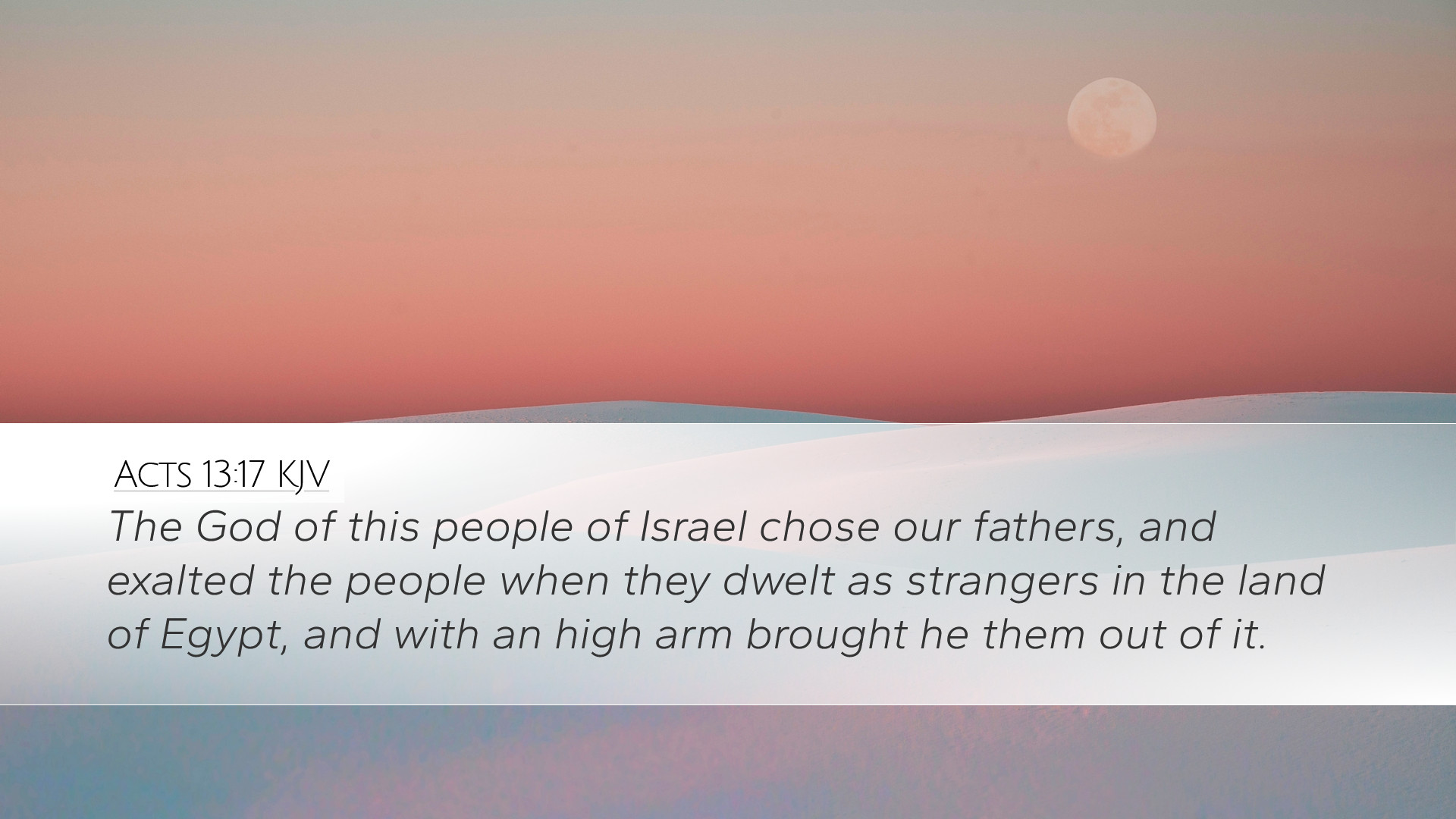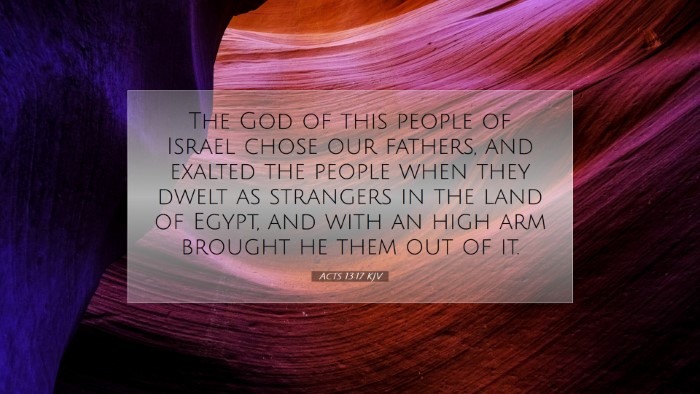Commentary on Acts 13:17
Acts 13:17 states: "The God of this people Israel chose our fathers, and exalted the people when they dwelt as strangers in the land of Egypt, and with a high arm brought he them out of it." This verse is pivotal in understanding God's plan for Israel and serves as an introduction to Paul's sermon at Antioch. Various commentaries provide rich insights into the contextual and theological implications of this verse.
Historical Context
This verse references the selection of Israel as God's chosen people, a theme that spans the Old Testament. Matthew Henry notes that God's choice of Israel was not based on their merit but on His sovereign purpose and grace. Albert Barnes complements this by emphasizing God's faithfulness to Israel's ancestors and His providential care throughout their history.
The Divine Choice of Israel
The opening phrase, "The God of this people Israel chose our fathers,” signifies God's sovereign initiative. Adam Clarke elaborates on this divine selection, indicating that God’s election was to fulfill His promises made to Abraham, Isaac, and Jacob. This chosen status implies responsibilities as well, challenging the recipients to live according to God’s covenant.
Key Thoughts on Election
- Unmerited Grace: Matthew Henry emphasizes that God’s election is not based on human nobility or righteousness but solely on His grace.
- Purposeful Calling: Clarke points out that God's calling is purposeful, as He seeks to achieve His plan through His people.
- Historical Significance: Barnes notes that the history of Israel is a testament to God's providential guidance, providing ample examples of His unwavering support.
Exaltation in Egypt
Next, the verse states, "and exalted the people when they dwelt as strangers in the land of Egypt". This passage acknowledges Israel's difficult circumstances in Egypt, where they were seen as outsiders and subjected to oppression. Despite this context, God’s exaltation implies deliverance and a promise of a future. Henry highlights that God’s exaltation often comes during times of trial and bondage, signifying that His plans are not hindered by human oppression.
Deliverance from Bondage
- God's Sovereignty: God purposefully elevated Israel to a place of prominence despite their lowly state, demonstrating His power to transform situations.
- Reflection on Faith: Clarke mentions that the Israelites' identity as God’s chosen people was not negated by their suffering, thus, Christians are called to maintain faith amid trials.
- Prefiguration of Salvation: Barnes connects this exodus to the ultimate salvation Christians experience through Christ, showcasing a typological relationship between Israel’s deliverance and salvation from sin.
The High Arm of God
Finally, the verse concludes with "and with a high arm brought he them out of it." The imagery of a "high arm" symbolizes strength and power. In biblical literature, God’s arm is often associated with His might in redeeming and saving His people. Henry articulates this as indicative of God’s intervention in human affairs, assuring His people of His involvement and commitment.
Insights on Divine Power
- Mighty Deliverance: The terminology implies an active and forceful liberation; God did not merely observe their plight but intervened.
- Encouragement to Believers: For contemporary believers, this serves as reassurance that God's strength is available in their challenges as they, too, may face trials.
- Symbol of Assurance: Barnes elaborates that the "high arm" is not just a historical reference but resonates with the present reality of God’s protective and redemptive power.
Theological Implications
The overarching theological theme in Acts 13:17 centers on God's sovereignty, grace, and liberation. The choice of Israel, their status as strangers, and God's mighty hand in their deliverance resonate deeply in the narrative of salvation history.
Reflection for Pastors and Scholars
- The Nature of God's Election: Pastors are encouraged to preach on the nature of divine choice and grace, moving beyond notions of merit to celebrate God’s mercy.
- Application of Deliverance: This verse can serve as a powerful reminder of God’s continuing work of salvation in believers’ lives, motivating them toward trust and hope.
- Understanding Trials: The narrative addresses the reality of suffering and God’s presence within it, prompting scholars to explore themes of perseverance and faith in adversity.
Conclusion
Acts 13:17 provides a lens through which we can view God's interactions with His people. The insights from commentaries by Matthews Henry, Albert Barnes, and Adam Clarke foster a comprehensive understanding of the theological weight behind the divine choice, the context of exaltation amidst trials, and the powerful deliverance by God's hand. This verse invites pastors, students, and theologians alike to engage deeply in the text and to articulate its implications for contemporary faith and practice.


